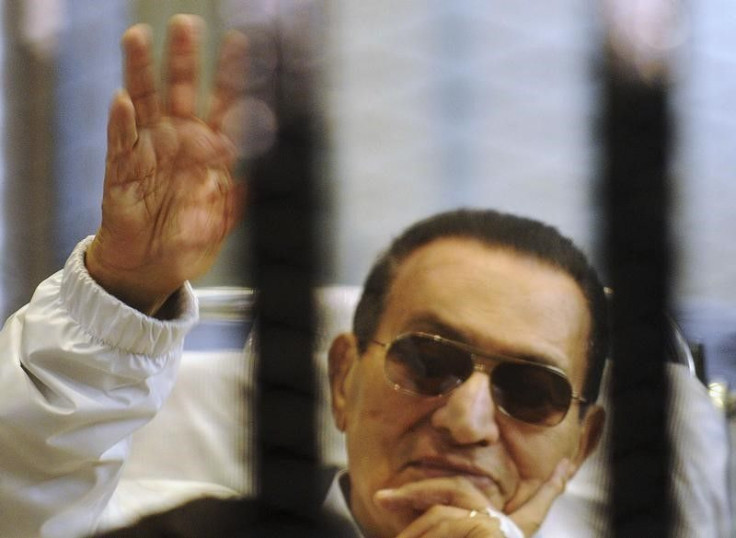Mubarak Retrial: Release Poses Challenge For Egypt's Sisi As Former Dictator Nears Freedom

The fate of former Egyptian dictator Hosni Mubarak poses a looming challenge for the government of current President Abdelfattah al-Sisi, particularly after the imprisoned leader’s only remaining conviction was overturned Tuesday, paving the way for his release. The potentially explosive consequences of his retrial could make for a tricky political situation for Sisi, who has in the past walked a careful public line on his former boss.
Tuesday’s ruling by the country’s top tribunal overturned a verdict from last May that had sentenced Mubarak to three years’ imprisonment on corruption charges. The court ordered the retrial of the former leader, whose release could be imminent pending approval from the Egyptian judiciary.
Mubarak, who is imprisoned in a military hospital due to unspecified health issues, would likely remain in the hospital in any event, according to the Associated Press. However, the symbolic blow of his acquittal and release would likely raise the ire of the pro-democracy and youth groups that spearheaded the country’s 2011 uprising, which led to the leader’s ouster after three decades of autocratic rule.
Egyptian court overturns Mubarak's 3-year jail sentence. I anticipate vigorous protests which may escalate to violence.
— Daniel J. Levy (@danielhalevy) January 13, 2015In late November, a court’s decision to drop all criminal charges against Mubarak, including murder charges for his role in the killing of hundreds of protesters during the uprising, led to some of the biggest demonstrations witnessed during Sisi’s presidency. Sisi later issued a conciliatory statement assuring the Egyptian public that there would be no return to the old Egypt and that he had instructed his prime minister, Ibrahim Mahlab, to review compensation arrangements for the families of "martyrs and those wounded in the revolution," reported Al Arabiya.
But the stiff response by security forces, who used water cannons, tear gas and live ammunition to disperse the protesters gathering in Cairo’s iconic Tahrir Square, belied the leader’s assurance about his government’s ability to smoothly navigate the critical test posed by the aftermath of the decision.
Sisi now faces the “unprecedented challenge” of Mubarak’s release, according to the New York Times, which pointed out that this would be “the first time in Egyptian history that a former president was allowed to live freely and speak openly.” Beyond the awkwardness of the possibility of having the former leader potentially weigh in on politics, Mubarak’s freedom could spark a new round of unwelcome protests. Any public appearance by the leader could provoke fresh unrest on the streets, said the BBC.
If there is a #Mubarak release, the image ramifications for the Egyptian state, especially the army which removed him, are significant.
— H.A. Hellyer د. إتش (@hahellyer) January 13, 2015The optics of releasing the strongman as Egypt faces international criticism for its record of imprisoning activists and journalists appears to be something the Sisi government is already attempting to mitigate. Shortly after news of the verdict emerged Tuesday, Egyptian Foreign Minister Sameh Shukri announced that Sisi could still pardon three jailed Al Jazeera journalists who are now facing a retrial on charges of helping a “terrorist organization,” reported Reuters. The three were sentenced last June to seven to 10 years in prison, and the case has attracted significant international attention and embarrassment for the Sisi government.
Sisi also issued a decree on Tuesday pardoning prisoners on the occasion of the upcoming anniversary of the Jan. 25, 2011, uprising, according to Egypt’s state-run Ahram Online. The announcement has led some to hope that political prisoners imprisoned under the country’s restrictive protest law might be freed.
Despite these apparent efforts to preempt the anger that would inevitably explode from Mubarak’s release, the bigger problem is not Mubarak’s fate alone but what the possibility of his release says about the state of reform within Egypt’s political institutions after 2011. As Egyptian politics expert H.A. Hellyer noted after charges were dropped against Mubarak in December, “Until someone in authority in Egypt recognizes that any future development of the country partially depends on a fully restructured system for both the security services and the judiciary, declaring Mubarak innocent will be the least of Egypt’s worries.”
© Copyright IBTimes 2024. All rights reserved.












